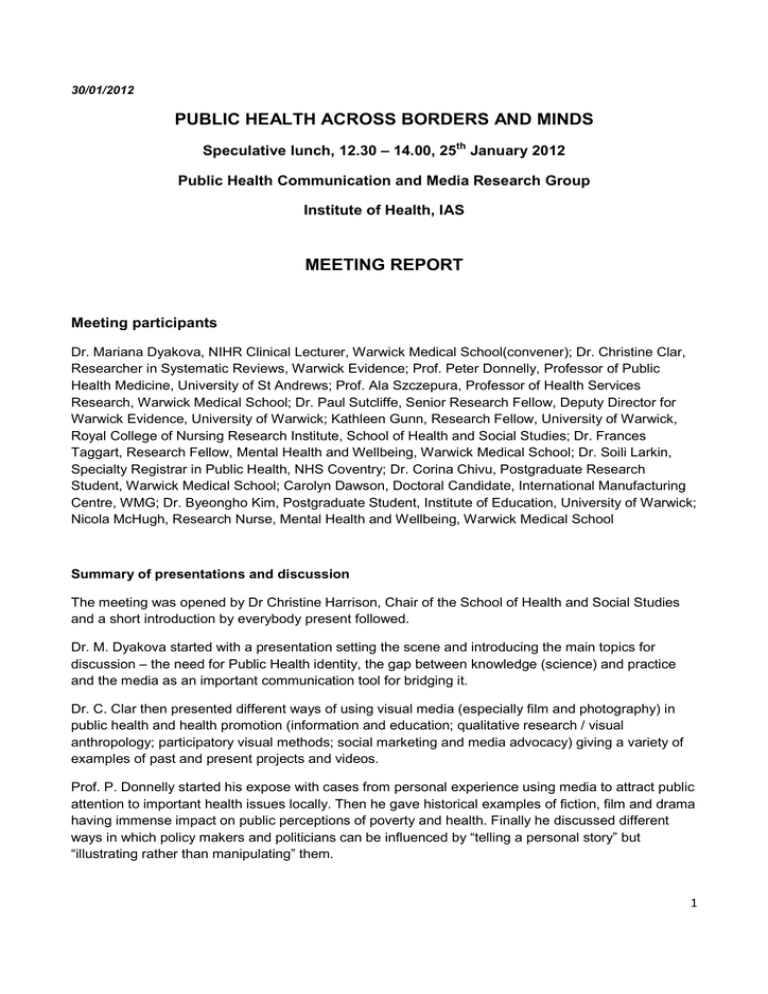PUBLIC HEALTH ACROSS BORDERS AND MINDS
advertisement

30/01/2012 PUBLIC HEALTH ACROSS BORDERS AND MINDS Speculative lunch, 12.30 – 14.00, 25th January 2012 Public Health Communication and Media Research Group Institute of Health, IAS MEETING REPORT Meeting participants Dr. Mariana Dyakova, NIHR Clinical Lecturer, Warwick Medical School(convener); Dr. Christine Clar, Researcher in Systematic Reviews, Warwick Evidence; Prof. Peter Donnelly, Professor of Public Health Medicine, University of St Andrews; Prof. Ala Szczepura, Professor of Health Services Research, Warwick Medical School; Dr. Paul Sutcliffe, Senior Research Fellow, Deputy Director for Warwick Evidence, University of Warwick; Kathleen Gunn, Research Fellow, University of Warwick, Royal College of Nursing Research Institute, School of Health and Social Studies; Dr. Frances Taggart, Research Fellow, Mental Health and Wellbeing, Warwick Medical School; Dr. Soili Larkin, Specialty Registrar in Public Health, NHS Coventry; Dr. Corina Chivu, Postgraduate Research Student, Warwick Medical School; Carolyn Dawson, Doctoral Candidate, International Manufacturing Centre, WMG; Dr. Byeongho Kim, Postgraduate Student, Institute of Education, University of Warwick; Nicola McHugh, Research Nurse, Mental Health and Wellbeing, Warwick Medical School Summary of presentations and discussion The meeting was opened by Dr Christine Harrison, Chair of the School of Health and Social Studies and a short introduction by everybody present followed. Dr. M. Dyakova started with a presentation setting the scene and introducing the main topics for discussion – the need for Public Health identity, the gap between knowledge (science) and practice and the media as an important communication tool for bridging it. Dr. C. Clar then presented different ways of using visual media (especially film and photography) in public health and health promotion (information and education; qualitative research / visual anthropology; participatory visual methods; social marketing and media advocacy) giving a variety of examples of past and present projects and videos. Prof. P. Donnelly started his expose with cases from personal experience using media to attract public attention to important health issues locally. Then he gave historical examples of fiction, film and drama having immense impact on public perceptions of poverty and health. Finally he discussed different ways in which policy makers and politicians can be influenced by “telling a personal story” but “illustrating rather than manipulating” them. 1 30/01/2012 Prof. Ala Szczepura commenced the discussion recommending more clear focus to be identified in view of future research. She suggested aiming either at communication (and media as its tool) or at behavioural change (as a final goal of health promotion). In the following debate a number of interesting thoughts and ideas emerged around: The content and the form of communication; The communication target populations to be decided: the public, the patients, the decisionmakers (politicians/leaders), the public health practitioners; Different social issues like ageism, racism, poverty, crime; The health care system and its impact on health incl. the present NHS/PH reform The variety of contemporary digital media and art and its role in society especially for young people etc. The question whether communication does not always ultimately aims at behavior change Further steps In light of the variety of expertise and opinions a few further activities were identified: 1. Prepare and distribute a short questionnaire to the research group members, asking for their general perceptions/ ideas and expertise related to the topic. 2. Focus on several specific ideas for future research through: Identifying target population groups for research / intervention Choosing particular media tool / approach Choosing particular public health topic / problem Pilot study / audit – health information available in existing popular websites; “health presence” in different media – websites, TV shows and movies, radio etc. 3. Prepare a review / systematic review of existing literature, evidence and /or ongoing research in the field (a possible research proposal) – mapping the field. Consulting the Cochrane / Campbell collaboration for existing / possible evidence synthesis group 4. Extend network with colleagues from the Psychology and Film departments 5. Develop an online repository for relevant references, links and resources (a possible research proposal) 6. Activities, identified in earlier discussions: Develop an interdisciplinary postgraduate module under the IATL Identify possible project ideas and funding sources for future research Organise “media meetings / events” for Warwick ECRs network; students and staff; broader audience (together with the Arts Centre) Special thanks to the Institute of Advanced Study for sponsoring the lunch and the accommodation of Professor Peter Donnelly Institute of Health for setting the research group and all organisational support 2

